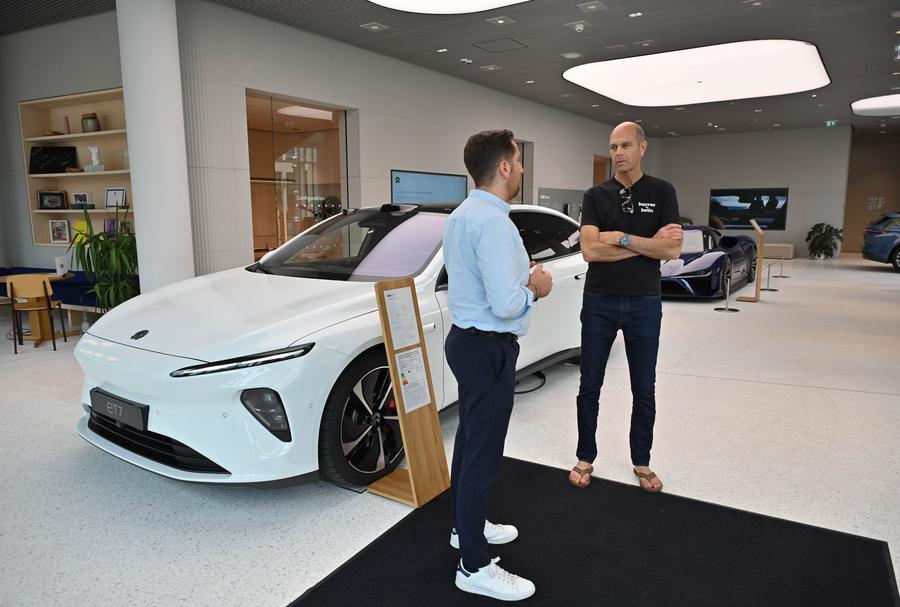Editor’s note: Bobby Naderi, a special commentator on current affairs for CGTN, is a London-based journalist and documentary filmmaker. The article reflects the author’s opinions, and not necessarily the views of CGTN.
The European Union (EU) has decided to press ahead with punishing tariffs on China-made electric vehicles (EVs) with the optimistic view is that it will offer temporary protection for its struggling EV manufacturers. Ironically, this latest episode may set the stage for severe disruptions to industries across the board.
If this practice of gaslighting the rest of the world is maintained because of what Brussels assumes as “Beijing’s unfair support” for companies that is undercutting European carmakers, the painful fallout will not just be felt within Europe but across the entire global economy. While protecting homegrown players might seem like a short-term fix, the long-term consequences could be devastating. And if that isn’t the definition of an economic nightmare, we’re not sure what is.
Supply chain chaos: A brewing storm
China plays a pivotal role in the intricate ecosystem of the global automotive supply chain. Weaponizing tariffs could set off a catastrophic chain reaction disrupting the delicate balance of this vital network.
Europe needs to import various components from China for which there is no statute of limitations or substitutes, including batteries and essential EV parts. Pushing forward with hefty tariffs would erode profitability for European companies, making a difficult situation even worse.
Without China, European automakers cannot get their act together, much less keep pace with challenges. Should they attempt to absorb new costs, profit margins will drop; and if they pass them on to consumers, prices will soar. Since Europe is desperate to accelerate its transition to renewable energy, this protectionist strategy would backfire spectacularly, costing them a fortune and a half.
The already stretched-thin suppliers of key materials like nickel, cobalt, and lithium could see demand plummet. If this downward spiral continues, Europe’s ability to incentivize domestic production would be severely compromised. No wonder big EU hitters like Germany are warning that tariffs won’t address China’s growing clout in hybrid vehicles and critical batteries or stop trade tensions from spreading to other theaters.

A staff member (L) explains the features of a vehicle to a visitor at a NIO House in Berlin, Germany, May 16, 2024. /Xinhua
Economic statecraft: A risk too great to ignore
China will not take this move lying down. The world’s second largest economy won’t be led around by the nose to give other powers what they want. It will protect its interests through economic statecraft and the EU should brace for a backlash. Retaliatory tariffs on European exports like chemicals, luxury goods, and machinery could be next on the table.
The EU should make full use of its political will to resolve the issue through negotiations instead of acting unilaterally without considering the consequences. The repercussions could be brutal for EU companies that have made significant inroads into China’s lucrative market. The cost of escalation is economic chaos, diminished profits, and untold damage to the 27-nation bloc’s standing in the global marketplace.
The fallout doesn’t stop there. With China and Europe at odds, the green energy sector would become collateral damage. Collaboration in EV technology, renewable energy, and innovation may be crippled as the two economic giants turn inward. Slowing innovation and severing vital partnerships would send the industry into reverse, stalling advancements in crucial areas like next-generation batteries and autonomous driving.
Global instability: A dangerous game
The risk of global economic destabilization is all too real. A tariff war isn’t just a bilateral issue, it could shake the foundations of the global economy. Many countries with tight trade links to both economic blocs would be caught in the crossfire, their growth hampered by restricted access to key markets and rising trade barriers.
No sector will be immune from the fallout if this brewing conflict is allowed to deepen. Since global cooperation is paramount on issues like climate change, the green energy transition could lose momentum, derailing climate goals on a global scale.
The margins for preventing an all-out tariff war are narrower than ever. The EU must reconsider its approach, as the cost of an economic cold war with China is something it cannot afford. Rather than erecting walls through blatant protectionism that lacks a factual and legal basis, the EU should build bridges for partnership. Until the bloc understands the necessity of a course correction, it risks steering the global economy toward a storm from which recovery may be painfully slow, if not impossible.
(If you want to contribute and have specific expertise, please contact us at opinions@cgtn.com. Follow @thouse_opinions on Twitter to discover the latest commentaries in the CGTN Opinion Section.)

